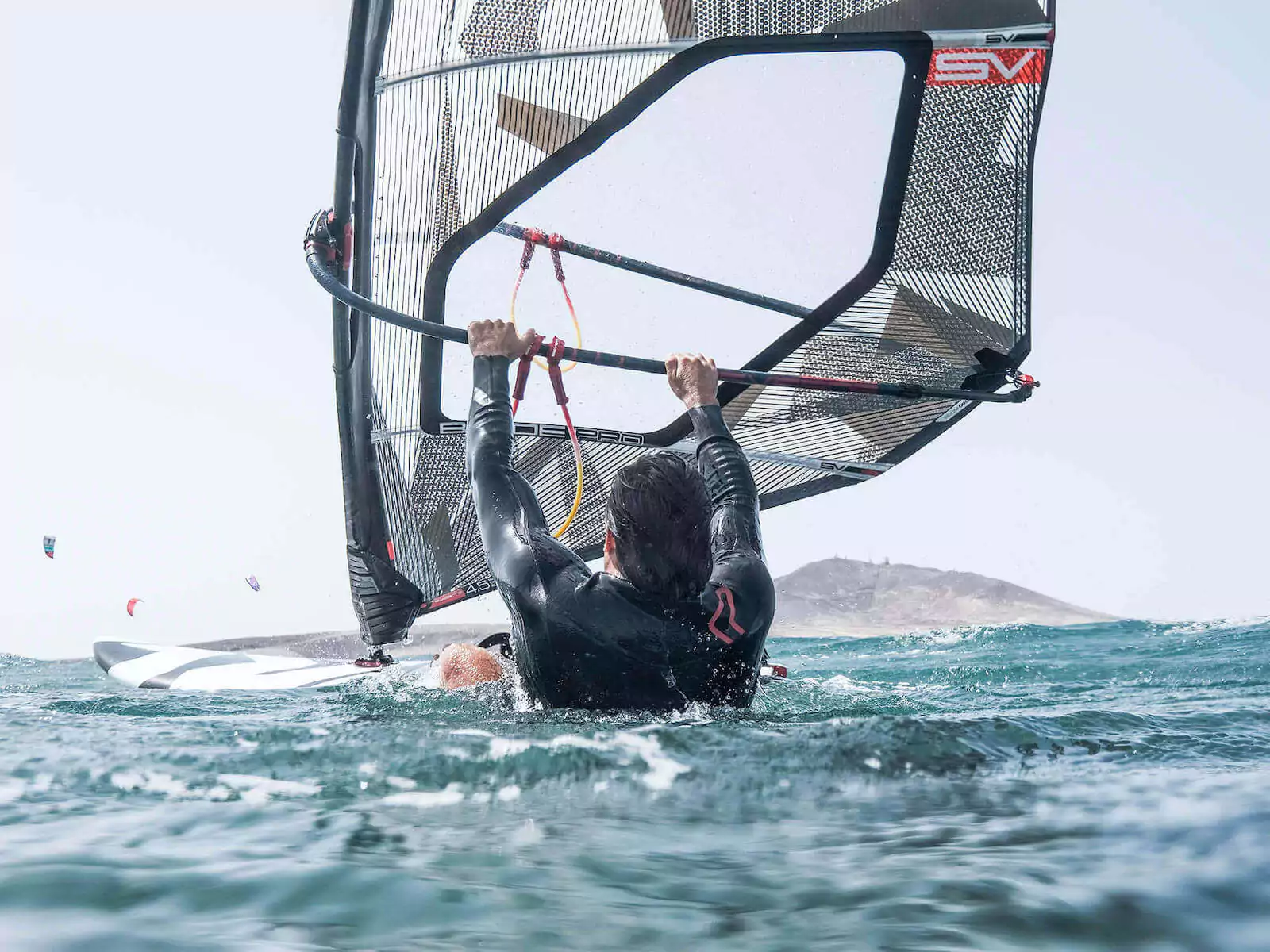
SUSTAINABILITY AND ENVIRONMENT
Caring For Our Future
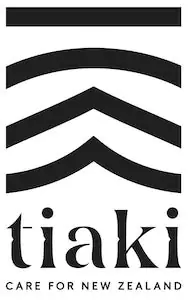
Tiaki means to care for people, place and culture.
Water Nomads is focused on the sustainability and environment of our business and our guests have in New Zealand. New Zealand is precious, and everyone who lives and travels here has a responsibility to look after it. The Tiaki Promise is a commitment to care for New Zealand, for now and for future generations.
By following the Tiaki Promise, you are making a commitment to New Zealand. To act as a guardian, protecting and preserving our home.
Nau mai, haere mai ki Aotearoa. Welcome to New Zealand.
How to care for Aoteroa New Zealand
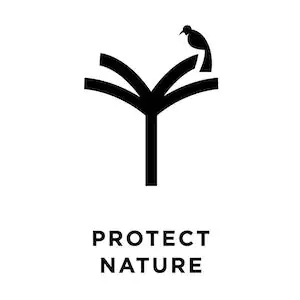
New Zealand’s nature is precious and many of our native species are endangered or at risk. Remember to care for land, sea, and nature when you travel.
If you encounter seals or sea lions, keep a distance of at least 20 metres. That’s around the length of a tennis court. Seals and sea lions are surprisingly quick on land and can become aggressive, with a nasty bite. Our native birds need space too. Many are endangered and may be nesting throughout the year. If you’re lucky enough to see dolphins or seals when out on the water, don’t get too close.
The use of drones in New Zealand is heavily regulated because of their impact on wildlife, Māori cultural values, safety, and privacy. If you do choose to bring a drone with you, you will need permission to fly it, even on public land. This usually requires a complex permitting process and will take some time. It’s easier and nicer for everyone to enjoy New Zealand’s beautiful scenery from the ground.
New Zealand’s forests have ancient and sometimes fragile ecosystems. Sadly, some parts of the country have been infected with diseases such as kauri dieback disease and didymo that can devastate native trees and waterways. Help prevent these diseases spreading by cleaning your footwear and gear between outdoor areas. All it can take is one droplet of water or speck of dirt to infect a new area.
In New Zealand, 99% of wildfires are started by people. Fire can have a devastating impact on forests and wildlife habitat. There are often fire restrictions in place to limit the risk of wildfires starting, so if you want to light a campfire or use a gas cooker, check the rules first at checkitsalright.nz
New Zealand’s native birds aren’t adapted to human food, so resist the temptation to feed them. It can make them sick, and in some cases, even kill them. For example, birds such as kākā can develop bone diseases from eating too many introduced nuts and seeds. Some of our cheekier birds such as kea or weka are good at begging for food and even stealing it from bags, but it can make them more likely to put themselves in danger.
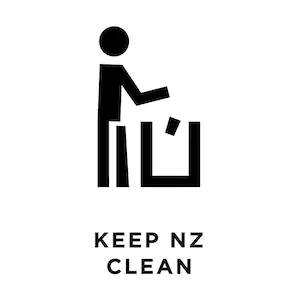
Kiwis are proud of this beautiful country and expect visitors to dispose of their litter and waste responsibly, even in remote areas.
Help to keep New Zealand’s environment free of litter and rubbish. This includes food scraps such as orange peels and apple cores. There are public rubbish and recycling bins and throughout the cities and towns of New Zealand that you can use. You can also find a directory of recycling stations on the beatidykiwi.nz website.
If you are going out into nature, including bush walks, beaches, and national parks, there probably won’t be any rubbish or recycling bins available. You must take your rubbish with you. This includes food scraps. Make your trip easier by taking a bag or container with you that you can store your rubbish in. If you see litter, please pick it up, even if it’s not yours.
You will find that there are long stretches of road without toilets or bathrooms available in parts of New Zealand. There are also very few toilets in our natural areas such as national parks, forests, mountains, and coastlines. Always go to the toilet before you go on a long drive or head into nature. If you are heading into more remote areas, make sure you are properly prepared. This includes taking any used tampons, pads or other period products away with you, until you can dispose of them in a sanitary bin.
Plastic bags are banned in New Zealand stores. While paper bags may be available, they still have an environmental impact. Make supermarket shopping easier and greener by carrying a reusable bag. Tap water in New Zealand is safe to drink. You can refill bottles for free from public drinking fountains, local cafes, or from the tap in your accommodation.
When camping, respect the environment by taking away all waste, ensuring you leave the camping area clean for those who come afterwards.
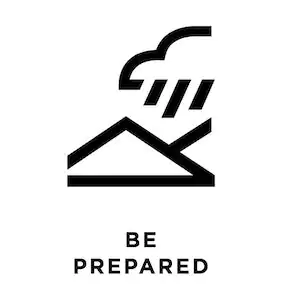
Exploring New Zealand’s great outdoors can be very different to what you might have experienced in other places. If you are leaving urban areas, some preparation can help you get the most out of your trip and keep yourself safe.
Fire, police, and ambulance services. Calls are free. Be aware that many places in rural New Zealand and national parks do not have cell phone reception. If you are hiking, hire a distress beacon so you can summon help if you need it.
Weather can change very quickly in New Zealand and at times be extremely dangerous. Check the weather forecast before you head outdoors. If there is rain, strong winds, or cold temperatures forecast, consider changing your plans. No matter what the forecast, be prepared for all conditions. It can be sunny, rainy, and windy in a single day.
Let someone know where you are going, and when you’ll be back. Ensure they know to dial 111 if you haven’t returned by that time. Online tools such as PlanMyWalk.nz or AdventureSmart.nz can also help you share your plans. If you’re a Spark or 2 Degrees customer, you can text your plans to 7233 (SAFE) for free. Plans will only be accessed in the event of an emergency
New Zealand is home to active volcanoes and sits on earthquake faultlines. If you are visiting a volcanic region, check the Volcanic Alert Level on the Geonet website. If you experience an earthquake, drop to the floor, get cover nearby, and hold on. If you are near the coast, take note of the Tsunami Evacuation Zones, and if you feel a long or strong earthquake, head inland or to a high point.
To keep safe when you swim, find a beach that is patrolled by lifeguards and stay in between the red and yellow flags. You can find out which beaches have lifeguards at safeswim.org.nz along with information on any dangers present. If you choose to swim at an unpatrolled beach, river, or lake, make sure you understand any dangers before you head out. Check Safeswim.org.nz, read any safety signs and talk to locals for advice. If in doubt, stay out.
If you are heading out into nature on a walk or hike, check you are prepared by following the Land Safety Code. Our weather changes very fast, the terrain can be very rough, you will often be in remote rural areas a long way from shops, and you will likely be without mobile phone reception. The Land Safety Code helps you to make sure you are well prepared. You can find it on the PlanMyWalk.nz or AdventureSmart.nz websites.
There are many Department of Conservation (DOC) and i-SITE visitor centres throughout New Zealand that can provide free, up-to-date and and tailored information for your next adventure. You can find one near you by searching online.
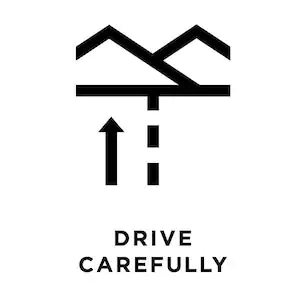
New Zealand has some of the most amazing scenic drives in the world, but our roads can be challenging at times. Drive carefully to keep yourself and others safe on the road.
You can legally drive in New Zealand for up to 12 months if you have a current driver’s licence or international driving permit. If the licence is not in English, you must carry an accurate English translation. You must carry your licence or permit and any translation at all times when driving.
In New Zealand we drive on the left-hand side of the road. This can be confusing if you are used to driving on the other side. You must remember to keep left at all times, especially as you come up to an intersection or pull out onto a road.
New Zealand roads can be narrow and windy and are mostly two-way with just one lane in each direction. Distances may seem short on a map but take much longer when driving. Allow for more time than you think you’ll need and make the journey a part of your holiday.
Make sure you are familiar with the New Zealand driving rules as these may differ from what you are used to. There are many resources to help you with this, including the official New Zealand Road Code.
Driving under the influence of alcohol or drugs is a serious offense and puts people’s lives at risk. In New Zealand drivers can be pulled over at any time, for any reason, to be breath-tested.
Stay on or below the legal speed limits indicated on road signs. These are displayed in kilometres per hour. You will need to adjust your speed to suit the weather and traffic conditions.

Travel with an open heart and mind. By taking the opportunity to understand our culture and respect our customs, you’ll have a positive impact on the communities you visit. In return, the people of Aotearoa New Zealand will leave a lasting impact on you.
You will likely come across marae (Māori meeting grounds) on your travels in New Zealand. You are generally welcome to stop and look from the outside, but do not enter without being invited. If you are lucky enough to be invited, your hosts will help you with the kawa (protocol). Always seek permission before taking photos.
Camping rules are generally set by local councils and vary across the country. You are not able to camp wherever you like. If you are camping in a tent or vehicle while travelling through New Zealand, it is always best to camp at an official campsite or campground. The Campermate App is a good place to find campsites as you travel.
Check for any public health restrictions in the areas you are travelling through. This includes settings under the COVID-19 Protection Framework which may change from region to region. Some communities can be remote and isolated from hospitals, so keeping locals safe is important. Wash or sanitise your hands and cough or sneeze into your elbow. Make sure to wear a mask and keep physically distanced where required.
If in doubt, check with a local for advice on what is appropriate. Check in with farmers or landowners before you cross paddocks or enter private land. Local business owners or community members are often happy to answer questions you may have or talk to the team at a local i-SITE Visitor Centre.
Wāhi tapu are culturally significant sites such as urupa (cemeteries), pā (Māori fortification) sites, or battle sites. Make sure to take nothing from the site and leave it as you found it. There may also be tikanga (protocols) in place, such as not eating, running, or making loud noises while at the wāhi tapu site. These may not always be signposted.